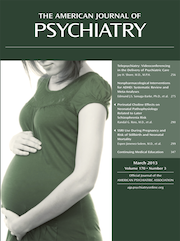Social and Nonsocial Cognition in Bipolar Disorder and Schizophrenia: Relative Levels of Impairment
Abstract
Objective
This study aimed to determine the relative extent of impairment in social and nonsocial cognitive domains in patients with bipolar disorder compared with schizophrenia patients and healthy comparison subjects.
Methods
Sixty-eight clinically stable outpatients with bipolar disorder, 38 clinically stable outpatients with schizophrenia, and 36 healthy comparison subjects completed a range of social (facial affect perception, emotional regulation, empathic accuracy, mental state attribution, and self-referential memory) and nonsocial (speed of processing, attention/vigilance, working memory, verbal memory, visual memory, and reasoning/problem solving) cognitive tasks.
Results
For each social cognitive task, patients with bipolar disorder did not differ significantly from comparison subjects, and both groups performed better than schizophrenia patients. Within the bipolar group, clinical features and medication status were not related to social cognitive performance. Bipolar patients showed performance patterns across tasks (i.e., profiles) that were similar to those of comparison subjects on both social and nonsocial cognitive domains, whereas both groups differed from schizophrenia patients for both domains. Regarding relative impairment across the two cognitive domains, results revealed a significant group-by-domain interaction in which bipolar patients showed less impaired social than nonsocial cognition, while schizophrenia patients showed the opposite pattern.
Conclusions
Bipolar patients showed less impairment on social relative to nonsocial cognitive performance, whereas schizophrenia patients showed more impairment on social relative to nonsocial cognitive performance. These results suggest that these two cognitive domains play different roles in bipolar disorder compared with in schizophrenia.



